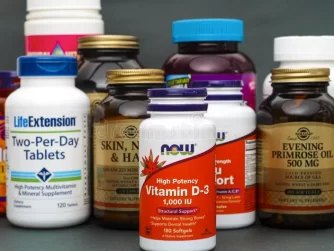Have you ever wondered why people call vitamin D the “sunshine vitamin”? Or why so many folks seem to be low in it, even though it sounds like something you’d easily get just by stepping outside?
You’re not alone.
As a nutritionist and fitness coach, I talk to people every day who feel sluggish, moody, or just “off”—and more often than not, vitamin D plays a part in the conversation. So let’s break this down in plain English. No confusing science talk—just the basics, the benefits, and what you can do starting today.
What Is Vitamin D?
Vitamin D is a fat-soluble vitamin, which means it dissolves in fat and is stored in your body’s fatty tissue. But here’s the cool part: it also acts like a hormone.
In fact, when your body gets vitamin D—either from food, supplements, or sunlight—it turns it into an active hormone called calcitriol. This hormone helps your body do all sorts of critical things, like absorbing calcium, supporting immune health, and keeping your muscles and nerves functioning properly.
So yeah—vitamin D is a big deal.
Where Does Vitamin D Come From?
There are three main ways to get vitamin D:
1. Sunlight (Your Body Makes It)
This is where the “sunshine vitamin” nickname comes from.
When your bare skin is exposed to sunlight—specifically UVB rays—your body starts a natural process to produce vitamin D3 (cholecalciferol). It’s kind of amazing. Your skin literally makes this vital nutrient just from light.
But here’s the catch:
- If you wear sunscreen (which you should for skin protection), it blocks UVB rays
- If you live in northern climates or it’s winter, sunlight is too weak
- If you have darker skin, it takes more sunlight to produce the same amount
- If you’re mostly indoors (hey, RV life or remote work folks!), your skin just isn’t exposed enough
So while the sun is a powerful vitamin D source, it’s not reliable for everyone year-round.
2. Food Sources
There aren’t tons of foods with natural vitamin D, but there are some:
- Fatty fish like salmon, sardines, tuna, and mackerel
- Egg yolks
- Liver (not everyone’s favorite, I know)
- Fortified foods like milk, orange juice, and cereal
Even with these, most people don’t get enough through food alone—unless you’re regularly eating fish or fortified products.
3. Supplements
This is the most common way people meet their needs today.
There are two types: D2 (ergocalciferol) and D3 (cholecalciferol). D3 is the preferred form—it’s what your body makes naturally from the sun, and it’s more effective at raising your vitamin D levels.
A simple daily dose (often between 1,000–5,000 IU) can help fill the gap, especially during fall and winter months.
Why Is Vitamin D So Important?
Let’s talk about what vitamin D actually does in your body—and why it matters for your health and your energy.
1. Bone Health
Vitamin D helps your body absorb calcium. Without it, calcium pretty much passes right through you. That means weak bones, higher risk of fractures, and conditions like osteoporosis.
Think of it like this: calcium is the brick, but vitamin D is the worker that carries the bricks where they need to go.
2. Muscle Strength & Performance
Research has shown that adequate vitamin D levels are linked to better muscle function and less risk of falls—especially in older adults. But even for younger people, low vitamin D can mean weaker workouts, slower recovery, and more fatigue.
3. Mood & Mental Health
Low levels of vitamin D have been associated with depression and seasonal affective disorder (SAD). Especially during winter months, when sunlight is low, many people notice a dip in mood.
A 2014 meta-analysis found that people with depression often have lower vitamin D levels—and that supplementing may improve symptoms in some individuals (source: Journal of Affective Disorders).
4. Immune Function
Vitamin D helps regulate the immune system. It’s like your body’s behind-the-scenes security guard—keeping viruses, inflammation, and autoimmune issues in check.
In fact, during the COVID-19 pandemic, studies looked into vitamin D’s role in helping the immune system respond more effectively.
The Pros and Cons of Having Enough (Or Not)
Let’s break it down.
Benefits of Having Enough Vitamin D:
- Strong bones and teeth
- More stable energy and mood
- Better muscle function
- Improved immune resilience
- Potential protection against certain chronic diseases (like heart disease and type 2 diabetes)
Risks of Deficiency:
- Fatigue and weakness
- Bone pain or muscle cramps
- Mood swings or depression
- Weaker immune system
- Increased risk of osteoporosis or fractures
And here’s the thing: vitamin D deficiency is incredibly common.
Some estimates suggest that over 40% of U.S. adults are deficient, with higher rates in northern states, darker-skinned populations, and older adults.
How Do You Know If You’re Low?
Symptoms can be vague—but if you often feel tired, down, or achy without explanation, it’s worth checking your vitamin D levels with a simple blood test (ask for 25-hydroxyvitamin D).
Most healthcare providers like to see levels around 30–50 ng/mL, but the “optimal” zone can vary depending on who you ask.
How to Boost Your Vitamin D Naturally
Here’s your go-to plan:
✅ Get some sun (safely)
Aim for 10–30 minutes of midday sun on bare skin (like arms and legs), a few times a week. Time varies based on skin tone and location.
✅ Eat vitamin D-rich foods
Try salmon 2x a week. Add eggs to breakfast. Choose fortified milk or plant-based milks with D3.
✅ Consider a supplement
Especially in fall/winter or if your blood test shows you’re low. Most people do well with 2,000–4,000 IU/day, but check with your doc.
✅ Get your levels checked
Once a year is a good idea—especially if you struggle with energy, mood, or bone health.
Final Thoughts from Coach Chris
Look—vitamin D isn’t just about preventing disease. It’s about helping you feel like yourself again.
When your vitamin D levels are where they should be, everything just works better. Your energy lifts. Your workouts feel stronger. Your mood stabilizes. You’re more “you.”
So take five minutes today—get outside, eat something real, and if needed, add a solid D3 supplement to your stack.
It’s simple, powerful, and one of the easiest ways to support your health—naturally.
And as always, if you’ve got questions, I’m here to help. Drop a comment, send me a message, or connect with me on social @coachchris_legionfitness.
Here’s to stronger bones, brighter moods, and more sunshine in your life.







